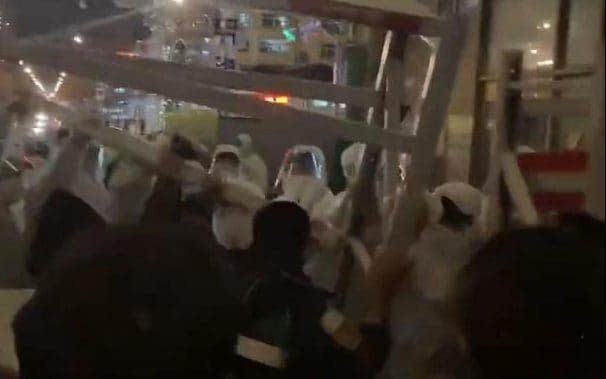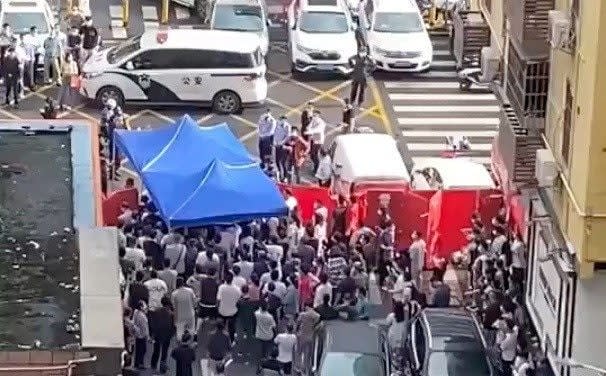Watch: Chinese protesters cry ‘Lift the lockdown!’ in fresh demonstrations

Chinese citizens are putting up fresh fights against Covid lockdowns in their neighbourhoods, emboldened by massive protests last week.
Clashes over Covid lockdowns erupted Tuesday in residential communities in the eastern city of Jinan and the southern metropolises of Shenzhen and Guangzhou.
Meanwhile, police in China’s major cities hunted down protesters who had participated in this weekend’s unrest, as tensions over draconian zero-Covid policies continue to boil over.
Videos circulating online showed residents of an apartment compound in Jinan shouting “Lift the lockdown!” while clashing with dozens of hazmat-clad Covid workers over metal racks that had been used to block access to the compound. The makeshift enclosure is seen falling apart, with people pushing for their freedom.
Social media comments later suggested the Jinan residents had reached an agreement with their compound managers to lift Covid restrictions.
Similar negotiations are being carried out across China as authorities are making small concessions after months of severe Covid lockdowns affecting millions of people.
济南历下区 城基中心 天阶泓都国际小区
此刻 ,民众正在与防疫人员发生冲突 pic.twitter.com/dSW4Z5DuzN— 李老师不是你老师 (@whyyoutouzhele) November 29, 2022
In Shenzhen, police were deployed at an apartment complex whose residents had had an altercation with Covid staff.
People’s occasional victories against Covid curbs coexist in China with protesters’ fresh fears over having participated in widespread and rare overt dissent against President Xi Jinping and his government last week.
Thousands had gathered in China’s megacities to demand the lifting of Covid restrictions and commemorate the victims of a deadly fire last week in the western region of Xinjiang.
On Tuesday, police were chasing down people who had gone to an anti-Covid protest in eastern Beijing, a protester told The Telegraph.
“I’m very worried,” the protester, who didn’t want her name used for fear of repercussions, said. Late on Tuesday, she had received a call to “have tea” with local police and was nervous about giving course to the invitation.
“Having tea” is a euphemism Chinese authorities use for meetings in which they warn or intimidate people they consider security threats.
One protester told Reuters they were asked to show up at a police station to deliver a written record of their activities on Sunday night.
“We are all desperately deleting our chat history,” a protester said.
“There are just too many police. Police came to check the ID of one of my friends and then took her away. We don't know why. A few hours later they released her.”
In some cases, if people refused to answer their phones, police showed up at their door.

As part of the interrogations, police asked protesters how many people there were, what time they joined the demonstrations and how they found out about it, a protester told AFP.
It’s unclear how the police knew how to track down protesters after the crowds had dissipated.
China has built the world’s largest surveillance network, with an estimated 540 million CCTV cameras and advanced facial recognition technology.
During last week’s protests, most participants wore face masks, partly due to Covid-related requirements, and partly as an attempt to hide their identities.
In Shanghai, where demonstrators made direct calls for President Xi Jinping and the ruling Communist Party to step down, police arrested a busload of people.
It’s unclear how many protesters were detained in Beijing and other cities.
In the eastern city of Hangzhou, police were shown in a video circulating on social media on Monday making an arrest while others tried to pull back the person being detained.
Police in Shanghai and Beijing have also been stopping passers-by at former protest areas, subway stations and intersections asking to inspect their phones for virtual private networks (VPNs) and banned apps such as Telegram.
VPNs are illegal for most people in China, while the country’s censored internet precludes access to most Western social media apps and major news sites.
One of the most high-profile arrests on Sunday was that of Edward Lawrence, a BBC journalist who was attacked and detained by Shanghai police while filming a protest, according to the broadcaster. He was released a few hours later.
A statement from the BBC on what happened to me in Shanghai last night while doing my job.
I understand at least one local national was arrested after trying to stop the police from beating me.
Thanks very much for the kind words and messages of concern. https://t.co/weoDAMakvO— Edward Lawrence (@EP_Lawrence) November 28, 2022
The British government on Tuesday summoned China’s ambassador to Britain over Mr Lawrence’s arrest.
China’s foreign ministry disputed the BBC’s account and said Mr Lawrence had not identified himself as a reporter.
A foreign ministry spokeswoman posted a mocking message on Twitter late Tuesday, saying the price of “freedom” in the US amounted to one million Covid deaths, tens of thousands of gun deaths per year and victims of Fentanyl deaths.
“What we want is to protect our people’s lives and ensure them a better life,” wrote spokesperson Hua Chunying.
Chinese authorities and state media have been largely silent about the protests, however, the National Health Commission on Tuesday acknowledged “the problems reported by the masses recently”.
China is seeing record numbers of Covid infections, with outbreaks in many megacities, including Beijing, Guangzhou and Chongqing.

 Yahoo Movies
Yahoo Movies 